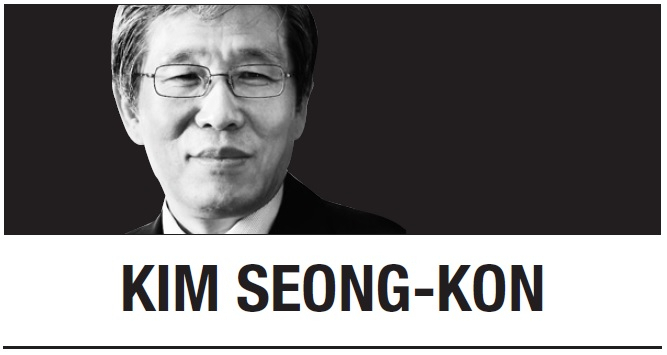
June 25 is the 74th anniversary of the Korean War. In 2050, The Korean War will be a century-old tragic disaster that devastated the Korean Peninsula in the mid-20th century. Sadly, it has already become “the forgotten war,” and by 2050, perhaps no one will remember it at all.
Still, however, a question arises, “Will South Korea be safe and sound until 2050?” We certainly hope so. Yet, considering belligerent North Korea’s frequent provocations, we cannot ignore the possibility that a second Korean War could occur before 2050. Are we ready for that, then? Few people would say “Yes.” Presently, we are so preoccupied with internal brawls between progressives who are pro-North Korea, and conservatives who are anti-North Korea, that we do not even realize the grave danger we are now facing.
Recently, North Korea sent numerous trash-carrying balloons to the South. In retaliation, the South Korean government has resumed making loudspeaker broadcasts toward the North. The dirty balloons are an impudent insult to South Koreans’ integrity, and yet, strangely, few South Koreans seem to be upset about it or feel inclined to organize protest rallies against North Korea’s grossly affronting behavior. Instead, they are angry at relatively trivial things, such as a singer’s traffic accident, allegedly while driving under the influence. We should stand up against bullies and support those who are in need of help. Embarrassingly, however, we seem to be doing the opposite.
Indeed, we have never called out the two arrogant countries that backed up North Korea during the Korean War to account for the damage they inflicted on us. We have neither protested strongly to North Korea for its invasion of the South in 1950 nor demanded the return of war prisoners. Instead, we frequently bend to them or timidly try to read their faces. Naturally, they have never apologized for their wrongdoings. On the contrary, we often wrongfully blame the friendly nation that saved us from total annihilation during the Korean War.
Another thing that worries us regarding North Korea’s balloons is the possibility that they might use them as a vehicle for biochemical weapons in the future. If the balloons had contained deadly biochemical components that burst all over the South, the outcome would have been disastrous. Perhaps North Korea’s latent intention of sending dirty balloons was to test and monitor the range of the balloons that would carry lethal biochemical materials in the future, rather than just insulting South Korea. Using biochemical weaponry, North Korea will be able to take over the South’s wealth without destroying it. Meanwhile, as “Newsweek” points out, South Koreans will die without knowing the reason.
Before they begin war, political leaders must think twice. In “The Divine Comedy,” Dante wrote that the warmongers are destined to suffer in the seventh circle in hell called “Violence” where they face punishment in a river of boiling blood and fire. Dante classified warmakers the same as murderers, plunderers, and tyrants. In the movie “300: Rise of an Empire,” the legendary Athenian general, Themistokles, utters in agony, “Every widow that is made by my decision, every child that will grow without a father, they are my choices. This is the burden of my command.” According to Dante, politicians who start wars without such agony are nothing but criminals and cold-blooded murderers.
During the Korean War, the UN, urged by the US, had sixteen countries dispatch ground troops and five countries send medical units to South Korea. Had it not been for their timely help, today’s South Korea could not have existed. Therefore, we should be eternally grateful to those countries since they came to rescue us when we desperately needed help. We cannot take foreign soldiers’ noble sacrifices for granted because they died “to defend the country they never knew and a people they never met,” as engraved in the US monument to the Korean War.
When and if the second Korean War breaks out, no rescuers are likely to come this time. We can no longer depend on the UN because the two above-mentioned allies of North Korea are manipulating the UN Security Council. We cannot rely on the US, either, because it might not want to interfere with Korean Peninsula conflicts anymore. Indeed, the American people no longer want to send their young soldiers to international conflicts. Why would Americans want to help other countries when the reward for their humanitarian help was nothing but anti-American sentiment? Granted this is the case, we will be all alone in times of crisis and have to defend our countries by ourselves.
In order to survive the upcoming crisis, we should be aware of the radical changes taking place in the world and adapt to them fast. As Charles Darwin said, the species that survive are not the strongest or the most intelligent, but the ones who best adapt to change. Commemorating the 74th anniversary of the Korean War, we should remember Darwin’s invaluable insight.
Kim Seong-kon
Kim Seong-kon is a professor emeritus of English at Seoul National University and a visiting scholar at Dartmouth College. The views expressed here are the writer’s own. -- Ed.







![[Herald Interview] How Gopizza got big in India](http://res.heraldm.com/phpwas/restmb_idxmake.php?idx=644&simg=/content/image/2024/11/20/20241120050057_0.jpg)